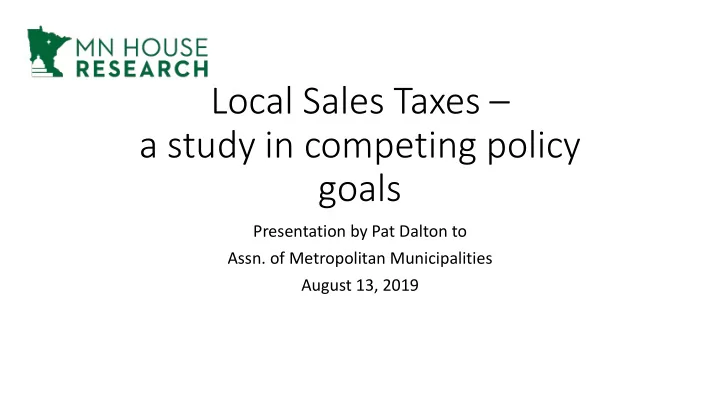

Local Sales Taxes – a study in competing policy goals Presentation by Pat Dalton to Assn. of Metropolitan Municipalities August 13, 2019
Why does the state control imposition of local sales taxes? • Granting local sales taxes makes it harder for the state to equalize local ability to pay for local government services • 1971 prohibition against local sales taxes was a subdivision of the new (at that time) local government aid (LGA) law • Not granting any suburbs local sales tax authority was in recognition of the inequity in retail distribution within the metro area • When granting local sales tax authority the legislature has tended to favor use for special capital projects with regional significance August 13, 2019 Minnesota House Research Department 2
So why has the legislature allowed any local sales taxes? • Regional projects need a regional funding source • The weight given to the trade-offs between the policy goals of local autonomy and funding equity have differed between tax chairs • Allowing local governments additional local funding tools is often more attractive when the state has budget problems • Political considerations play into granting some local authority • Result is that the ease of getting special local sales tax legislation has varied over time August 13, 2019 Minnesota House Research Department 3
Number of local sales taxes authorized or extended by special law per year Number of new or extended local sales taxes 20 18 16 14 12 10 8 6 4 2 0 * No tax bill in that session Session Year August 13, 2019 Minnesota House Research Department 4
History of Local Sales Tax Statute • 1997: Minn. Stat. §297A.48 (later recodified as §297A.99) enacted primarily to standardize the method used in writing legislation, • 1998 and 1999: the resolution and local referendum requirements were added to statute • 7/2008-6/2010: local governments prohibited from spending any money to promote or even hold a referendum on a local sales tax; in 2011 they were allowed to again hold a referendum, and in 2013 they could again spend money to provide facts but not promote • In 2011 began requiring that the referendum be held before coming to the legislature August 13, 2019 Minnesota House Research Department 5
So why the big increase in authority in 2019? • Previous tax chairs generally supported local authority if approved by voters • Record number of referenda on the ballots at the 2018 general election • Unlike previous years the majority of referenda passed • Factors that may have contributed to the high passage rate • Uncertain growth in state support for local projects • Multiple projects bundled together and vague wording in referenda might have led to more local buy-in August 13, 2019 Minnesota House Research Department 6
Legislative response to 2018 referenda • House had a much shorter list of allowed local taxes than Senate but in the end the political decision was to grant authority to cities that played by the existing rules • Virtually all cities that passed a referendum were granted authority; including suburbs for the first time • Some cities are required to pass a new resolution with more detail because the House chairs felt their referenda were too vague • Made changes to statute so going forward legislators and voters have more information and control August 13, 2019 Minnesota House Research Department 7
Statutory changes that increase legislative control • Require that voter approval only occur after the legislature has vetted the projects to be funded and the authority is granted • Limits use of revenue to projects with clear regional benefit beyond the jurisdictional limits • Requires that the initial city resolution enumerate no more than 5 projects to be funded • Local government must submit to tax chairs by January 31 of the year in which the legislation is sought the list of projects to be funded and documentation of why each project is of regional significance August 13, 2019 Minnesota House Research Department 8
Changes that increase local voter information and control • Allows local government to spend money to disseminate information only if each project and its cost is listed separately • The information sent to the tax chairs on beneficiaries of each project will also be available to interested individuals • Requires a separate question for each project to be funded, with the amount of revenue that a local government may raise under the special authority decreased for any project questions that fail August 13, 2019 Minnesota House Research Department 9
What does this mean for cities in the future? • New requirements are likely to discourage some cities from seeking local sales tax authority • Suburbs that can make a “regional significance” case are more likely to get sales tax authority in the future • Policy makers seeking to use state aids to equalize local revenues may want to add local retail bases into the “ability to raise revenue” side of any future aid formulas. • Final caveat: Statutes are not written in stone and may be changed or circumvented by “not withstanding” language. August 13, 2019 Minnesota House Research Department 10
Minnesota House Research Department provides nonpartisan legislative, legal, and information services to the Minnesota House of Representatives. www.house.mn/hrd 651-296-6753 600 State Office Building St. Paul, MN 55155 July 9, 2019 City LGA / Minnesota House Research Department 11
Recommend
More recommend